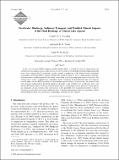Freshwater Discharge, Sediment Transport, and Modeled Climate Impacts of the Final Drainage of Glacial Lake Agassiz
Author(s)
Bush, John W. M.
DownloadClarke-2009-Freshwater discharge.pdf (2.724Mb)
PUBLISHER_POLICY
Publisher Policy
Article is made available in accordance with the publisher's policy and may be subject to US copyright law. Please refer to the publisher's site for terms of use.
Terms of use
Metadata
Show full item recordAbstract
A cold event at around 8200 calendar years BP and the release, at around that time, of a huge freshwater outburst from ice-dammed glacial Lake Agassiz have lent support to the idea that the flood triggered the cold event. Some suggest that the freshwater addition caused a weakening of the North Atlantic meridional overturning circulation (MOC) thereby reducing the ocean transport of heat to high northern latitudes. Although several modeling efforts lend strength to this claim, the paleoceanographic record is equivocal. The authors’ aim is to use a coupled ocean–atmosphere model to examine the possibility that the two events are causally linked but that MOC reduction was not the main agent of change. It is found that the outburst flood and associated redirection of postflood meltwater drainage to the Labrador Sea, via Hudson Strait, can freshen the North Atlantic, leading to reduced salinity and sea surface temperature, and thus to increased sea ice production at high latitudes. The results point to the possibility that the preflood outflow to the St. Lawrence was extremely turbid and sufficiently dense to become hyperpycnal, whereas the postflood outflow through Hudson Strait had a lower load of suspended sediment and was buoyant.
Date issued
2009-04Department
Massachusetts Institute of Technology. Department of MathematicsJournal
Journal of Climate
Publisher
American Meteorological Society
Citation
Clarke, Garry K. C., Andrew B. G. Bush, and John W. M. Bush. “Freshwater Discharge, Sediment Transport, and Modeled Climate Impacts of the Final Drainage of Glacial Lake Agassiz.” Journal of Climate 22.8 (2009): 2161-2180. © 2009 American Meteorological Society
Version: Final published version
ISSN
0894-8755
Keywords
Canadian Institute for Advanced Research, Natural Sciences and Engineering Research Council of Canada, Canadian Foundation for Climate and Atmospheric Sciences (CFCAS)